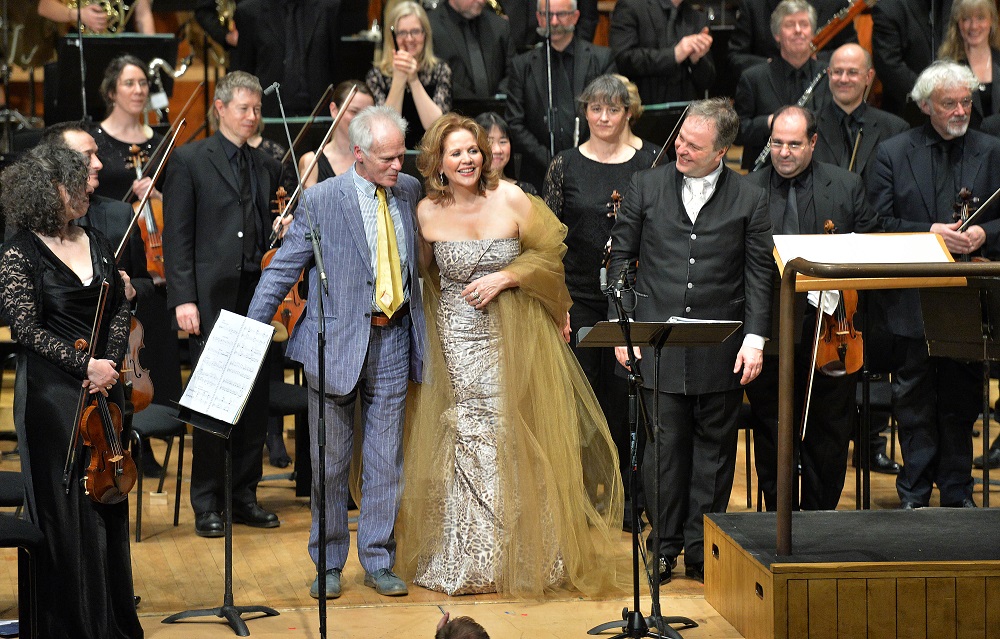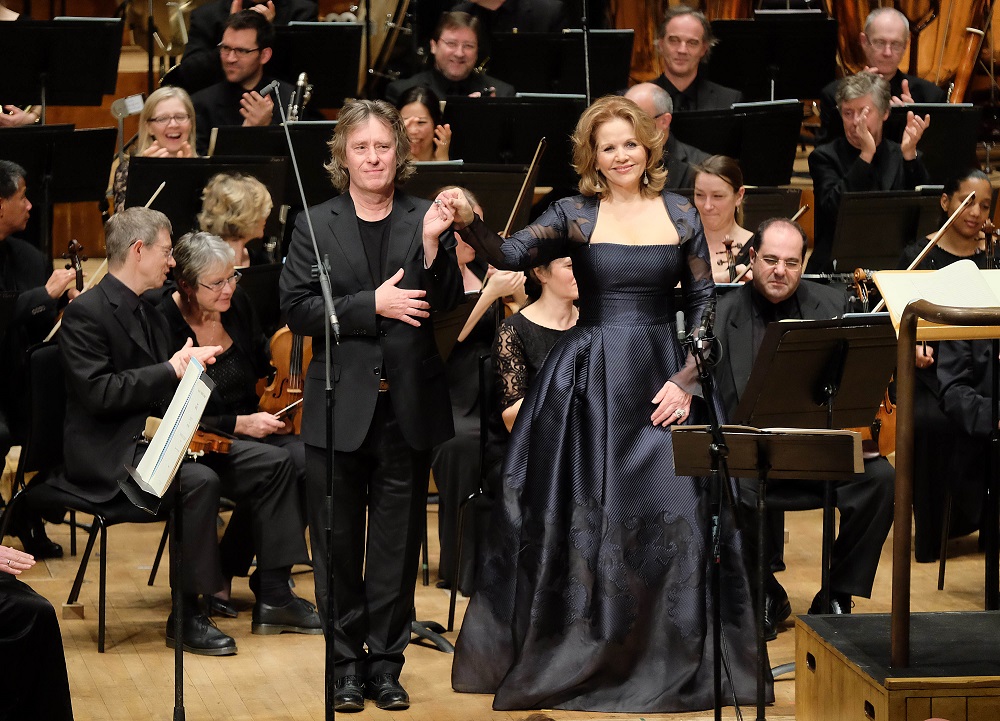Fleming, BBCSO, Oramo, Barbican | reviews, news & interviews
Fleming, BBCSO, Oramo, Barbican
Fleming, BBCSO, Oramo, Barbican
Star soprano shines in adventurous new works
Renée Fleming recently announced her imminent retirement from the opera stage. But she has no plans to stop performing, and will instead devote her time to recitals and concerts. Yesterday’s excellent performance with the BBC Symphony Orchestra bodes well for her new career focus. And she’s not one to rest on her laurels, here giving UK premieres of two new works written for her voice, ever the adventurous artist, always playing to her strengths.
Now in her late 50s, Fleming can hardly be said to sound young. She has lost some of the flexibility in her tone, and no longer projects as freely or as naturally as in decades past. She is most secure in the top register, where her tone is still pure and she can project with greater ease. Lower down, she loses tonal focus. But the personality and distinctive timbre are as apparent as ever, that light, playful quality and speech-like ease of diction. When the music suits her, the results are magical.

Fleming sings the Debussy wonderfully. Her French sounds perfectly idiomatic (at least to these barely-Francophone ears) with satisfyingly nasal vowels. Some of the songs feel a little low for her, and Holloway makes no concession in his balances, but in the high register she floats gracefully across the textures.
Anders Hillborg’s The Strand Settings was completed in 2013, to a commission from the New York Philharmonic. The texts, by Mark Strand, date from the last 20 years or so and have a very contemporary feel, poetic in structure but avoiding elaborate metaphors or archaic constructions. There is a dark, nocturnal quality to the texts that Hillborg (pictured below with Fleming) puts across effectively. His general approach is to hold string chords as a background, above which Fleming sings in a free recitative style, interspersed, or overlayed, with more complex textures in the winds and percussion.

To frame the programme, two Diaghilev ballets, Debussy’s Prélude à l’après-midi d’un faune to open and the Second Suite from Ravel’s Daphnis and Chloe as a finale. Sakari Oramo led fine performances of both, disciplined but not overly strict. The BBC Singers were a little swamped in the Ravel, but their contributions were suitably atmospheric. Both scores are dominated by the flute, and Michael Cox, the BBCSO’s principal, gave outstanding performances, as did the whole of his section in the Ravel. All round, an imaginative programme, performed with colour and flair by the orchestra, and an ideal showcase for the talents of their celebrity guest.
- Listen to the concert on BBC Radio iPlayer for 30 days
The future of Arts Journalism
You can stop theartsdesk.com closing!
We urgently need financing to survive. Our fundraising drive has thus far raised £49,000 but we need to reach £100,000 or we will be forced to close. Please contribute here: https://gofund.me/c3f6033d
And if you can forward this information to anyone who might assist, we’d be grateful.

Subscribe to theartsdesk.com
Thank you for continuing to read our work on theartsdesk.com. For unlimited access to every article in its entirety, including our archive of more than 15,000 pieces, we're asking for £5 per month or £40 per year. We feel it's a very good deal, and hope you do too.
To take a subscription now simply click here.
And if you're looking for that extra gift for a friend or family member, why not treat them to a theartsdesk.com gift subscription?
more Classical music
 From Historical to Hip-Hop, Classically Black Music Festival, Kings Place review - a cluster of impressive stars for the future
From quasi-Mozartian elegance to the gritty humour of a kitchen inspection
From Historical to Hip-Hop, Classically Black Music Festival, Kings Place review - a cluster of impressive stars for the future
From quasi-Mozartian elegance to the gritty humour of a kitchen inspection
 Shibe, LSO, Adès, Barbican review - gaudy and glorious new music alongside serene Sibelius
Adès’s passion makes persuasive case for the music he loves, both new and old
Shibe, LSO, Adès, Barbican review - gaudy and glorious new music alongside serene Sibelius
Adès’s passion makes persuasive case for the music he loves, both new and old
 Anja Mittermüller, Richard Fu, Wigmore Hall review - a glorious hall debut
The Austrian mezzo shines - at the age of 22
Anja Mittermüller, Richard Fu, Wigmore Hall review - a glorious hall debut
The Austrian mezzo shines - at the age of 22
 First Person: clarinettist Oliver Pashley on the new horizons of The Hermes Experiment's latest album
Compositions by members of this unusual quartet feature for the first time
First Person: clarinettist Oliver Pashley on the new horizons of The Hermes Experiment's latest album
Compositions by members of this unusual quartet feature for the first time
 Gesualdo Passione, Les Arts Florissants, Amala Dior Company, Barbican review - inspired collaboration excavates the music's humanity
At times it was like watching an anarchic religious procession
Gesualdo Passione, Les Arts Florissants, Amala Dior Company, Barbican review - inspired collaboration excavates the music's humanity
At times it was like watching an anarchic religious procession
 Classical CDs: Camels, concrete and cabaret
An influential American composer's 90th birthday box, plus British piano concertos and a father-and-son duo
Classical CDs: Camels, concrete and cabaret
An influential American composer's 90th birthday box, plus British piano concertos and a father-and-son duo
 Cockerham, Manchester Camerata, Sheen, Martin Harris Centre, Manchester review - re-enacting the dawn of modernism
Two UK premieres added to three miniatures from a seminal event of January 1914
Cockerham, Manchester Camerata, Sheen, Martin Harris Centre, Manchester review - re-enacting the dawn of modernism
Two UK premieres added to three miniatures from a seminal event of January 1914
 Kempf, Brno Philharmonic, Davies, Bridgewater Hall, Manchester review - European tradition meets American jazz
Bouncing Czechs enjoy their Gershwin and Brubeck alongside Janáček and Dvořák
Kempf, Brno Philharmonic, Davies, Bridgewater Hall, Manchester review - European tradition meets American jazz
Bouncing Czechs enjoy their Gershwin and Brubeck alongside Janáček and Dvořák
 Solomon, OAE, Butt, QEH review - daft Biblical whitewashing with great choruses
Even a top soprano and mezzo can’t make this Handel paean wholly convincing
Solomon, OAE, Butt, QEH review - daft Biblical whitewashing with great choruses
Even a top soprano and mezzo can’t make this Handel paean wholly convincing
 Two-Piano Gala, Kings Place review - shining constellations
London Piano Festival curators and illustrious friends entertain and enlighten
Two-Piano Gala, Kings Place review - shining constellations
London Piano Festival curators and illustrious friends entertain and enlighten
 Echo Vocal Ensemble, Latto, Union Chapel review - eclectic choral programme garlanded with dance
Beautiful singing at the heart of an imaginative and stylistically varied concert
Echo Vocal Ensemble, Latto, Union Chapel review - eclectic choral programme garlanded with dance
Beautiful singing at the heart of an imaginative and stylistically varied concert
 Scott, Irish Baroque Orchestra, Whelan, RIAM, Dublin review - towards a Mozart masterpiece
Characteristic joy and enlightenment from this team, but a valveless horn brings problems
Scott, Irish Baroque Orchestra, Whelan, RIAM, Dublin review - towards a Mozart masterpiece
Characteristic joy and enlightenment from this team, but a valveless horn brings problems

Add comment